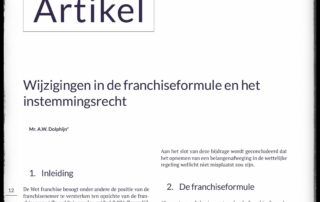The healthcare franchisor is not a healthcare provider
The Healthcare Quality, Complaints and Disputes Act (WKKGZ) creates the possibility of government measures being imposed on healthcare institutions to guarantee the required quality of healthcare. Can such a measure of the Health and Youth Care Inspectorate be imposed on a franchisor? The District Court of Rotterdam ruled on this on 25 January 2018, ECLI:NL:RBROT:2018:495
At issue was that a franchisor operates a franchise formula in the healthcare sector. There was an incident with a patient at a franchisee in Tilburg, in which the patient eventually died. The franchisee in question has entered into discussions with the Inspectorate and has implemented a number of improvements. The Inspectorate then visited a franchisee in Arnhem. It was established that this franchisee (also) did not meet the safety standards.
The Inspectorate then took a decision based on the WKKGZ, on the basis of which the franchisor must take measures to guarantee the necessary care. It has also been decided to publish the relevant decision as a press release on the Inspectorate’s website.
The franchisor believes that it cannot be qualified as a “care provider” and that therefore no measures can be imposed on it by the Inspectorate. It is argued against this that the franchisor, together with its franchisees, forms an organizational relationship that serves to provide professional care. This is because the franchisor creates conditions for its franchisees for the provision of good care and the franchisor can therefore be qualified as a care provider.
The court rules that in this case the franchisor cannot be qualified as a ‘care provider’. The following is decisive for this:
- the franchisees enter into contracts with clients/patients in their own name;
- the franchisees themselves provide accommodation for clients/patients;
- no further obligation is imposed on the franchisees by the franchisor on the basis of a franchise agreement other than to provide care that is in accordance with legal requirements;
- the franchisees are independent companies that are not subordinate to the franchisor.
It follows from the foregoing that not in all cases a franchisor cannot also be qualified as a ‘care provider’ within the meaning of the WKKGZ. What will be important is how the actual organization is put together and, in particular, the content and purport of the franchise agreement. Franchisors in the healthcare sector, but also franchisees in the healthcare sector, should ask themselves whether they fall under the WKKGZ as a healthcare provider, given the far-reaching implications of this law.
mr. AW Dolphijn – franchise lawyer
Ludwig & Van Dam Franchise attorneys, franchise legal advice. Do you want to respond? Go to dolphijn@ludwigvandam.nl .

Other messages
Changes to the franchise formula and the right of consent
An article by Mr. was published in the leading legal ...
The National Franchise podcast
Guests on the National Franchise podcast are: Theodoor Ludwig ...
(Im)possibilities in case of bankruptcy
The past few years have been a period with ...
Ludwig & Van Dam in Distrifood about the future of independent supermarket entrepreneurs
However, many retailers are now at a loss due to ...
No standstill period for prior collaboration based on the same formula
On December 29, 2023, ECLI:NL:RBDHA:2023:20931, the District Court of The ...
Standstill period: four weeks is and remains four weeks!
Standstill period: four weeks is and remains four weeks! ...







